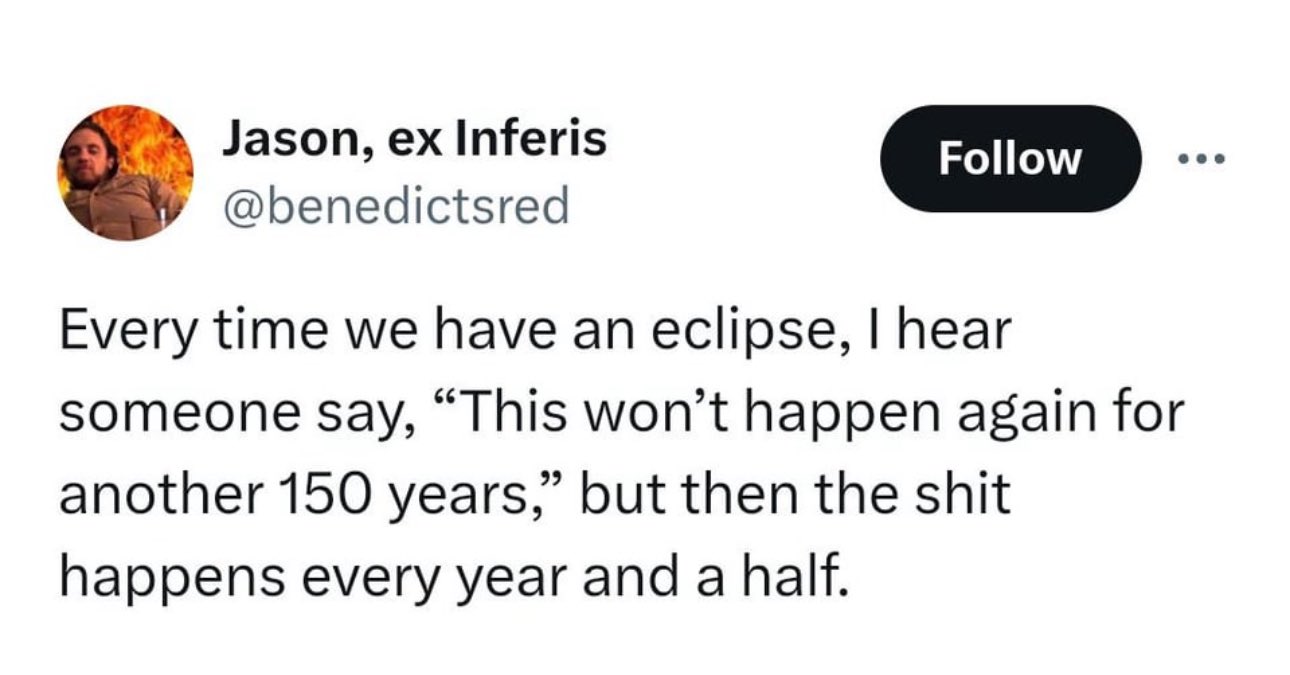this post was submitted on 07 Apr 2024
779 points (94.3% liked)
People Twitter
5268 readers
1100 users here now
People tweeting stuff. We allow tweets from anyone.
RULES:
- Mark NSFW content.
- No doxxing people.
- Must be a tweet or similar
- No bullying or international politcs
- Be excellent to each other.
founded 1 year ago
MODERATORS
you are viewing a single comment's thread
view the rest of the comments
view the rest of the comments

The extremely unlikely, a d actually entirely coincidental, fact that our moon happens to be precisely the right size and distance from the sun and moon to perfectly obscure it.
If it were further away or smaller, it wouldn't block it out completely and we'd just get annular eclipses, which doesn't let you see the corona, just a ring you shouldn't look at directly without eye protection.
If it were bigger or closer, it would obscure the corona and we'd just see darkness.
Stellar bodies lining up is perfectly normal and commonplace. Them being exactly the right size shape and distance to create a total eclipse is fantastically unlikely.
Doubly so when you consider that the moon is slowly moving away, and so a long time ago the moon was too big in the sky, and in about 50 million years it'll be too small.
Something so unlikely happening during the time there's intelligent life on the planet that can understand and appreciate it is, literally and figuratively, astronomicaly unlikely. 😀
it's extremely unlikely and entirely coincidental that your hand is exactly the size to obscure your vision. this doesn't speak for the odds of it never happening again elsewhere in the universe.
What?
Like, the thing about the hand aside, if something is extremely unlikely, that literally speaks to the odds of it happening. That's what unlikely means.
Your hand covering your face isn't coincidental or unlikely; everyone's hand does and it's written into your genetics that it should.
There's no particular reason why a big rock should end up in the particular place it did for us, and it's surprising that it did.
It's not likely that it happens often because there's no reason for it to happen, unlike other interesting phenomenon we see like the big red spot on Jupiter or the hexagon on Saturn. Those should be common because there's a systemic reason they happened.
they're both conjecture based on a microscopic sample size.
ahem, this is so wrong in so many ways.
Nope.
pshew wow nope nope nope.
Nothing in your genes controls a proportional size relationship of your hands to your head. And not everyone has large hands, look at trump for example.
you really don't understand planetary formation, stability in orbital mechanics and a bunch of subjects. there's tons of good reasons to suspect the other planets had moons as well; they simply weren't as orbitally stable as ours ended up.
The only thing your (and other person I'm responding to here) argument has going for it is the extraordinarily difficulty of resolving exomoons orbiting exoplanets around our neighborhood.
I only specified the Milky Way, not the entire universe. It would be highly unlikely that we'd be the only place in the universe that it happened, but the chances are potentially low enough for it being the only one among a mere 100,000,000,000 stars.